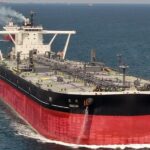Energy News Beat
Daily Standup Top Stories
“Irreparable injury:” Courts order dismantling of wind farms in US, France
A pair of geographically diverse court decisions handed down in December have ordered two wind farms be dismantled, highlighting the importance for renewable energy developers of securing all necessary approvals, including environmental and social. The […]
Nicola Sturgeon’s Flagship Hybrid Ferry Now Only Runs on Diesel As Battery Too Expensive to Fix
The MV Hallaig, a hybrid electric ferry in Scotland, celebrated for reducing emissions, is now running on diesel due to a lengthy £1.5 million battery replacement. The Daily Record has the story. The MV Hallaig was the […]
FRANCE DROPS RENEWABLES TARGETS IN NEW ENERGY BILL
PARIS – Critics are deriding as a step backward a new French energy bill that favours the further development of nuclear power and avoids setting targets for solar and wind power and other renewables. France, […]
The Government’s Hydrogen Policy is a Crime Against Thermodynamics
Back in the summer, there were signs that the consensus around Net Zero policy was starting to crack. The Prime Minister, Rishi Sunak then made his speech that watered down some Net Zero commitments and promised “a more pragmatic, proportionate […]
German Farmers Begin 8 Day Massive Protest Against Increased Government Taxation and Alarmist Climate Agenda
You will likely hear the term “farm subsidies” as Western media claim the German farmers are protesting the decisions by government. However, what they are protesting is not a hand-out of government funds, but rather […]
Highlights of the Podcast
00:00 – Intro
02:06 – “Irreparable injury:” Courts order dismantling of wind farms in US, France
02:22 – Nicola Sturgeon’s Flagship Hybrid Ferry Now Only Runs on Diesel As Battery Too Expensive to Fix
04:51 – FRANCE DROPS RENEWABLES TARGETS IN NEW ENERGY BILL
06:41 – The Government’s Hydrogen Policy is a Crime Against Thermodynamics
16:40 – Outro
Follow Stuart On LinkedIn and Twitter
Follow Michael On LinkedIn and Twitter
– Get in Contact With The Show –
Video Transcription edited for grammar. We disavow any errors unless they make us look better or smarter.
Stuart Turley: [00:00:15] Hello, everybody. Welcome to the Energy News Beat podcast. My name’s Stu Turley president CEO of the sandstone Group. Today is January 10th, 2024. It’s kind of amazing. Hey, I got an action packed show today. But I’ll tell you what. There’s a couple things in this thread. We’ve got legal, we’ve got a regulatory legislation through regulatory actions and we’ve got international funny kind of stuff. So hang on, buckle up. Get your flight suit. We are going over, uh, across the pond, and this one’s pretty funny. Uh, Nicola Sturgeon’s flagship hybrid ferry now runs only on diesel battery is too expensive to fix. You gotta love that one. Yesterday, Michael and I talked about France and bringing in, uh, the new renewable targets. And this coincides with their nuclear, um, fleet that they’re expanding out. Pretty cool news there. I’ll tell you what. This next story is pretty amazing. It’s about the government’s hydrogen policy is a crime against thermodynamics. We’ll cover this here in a second. Always gotta love me a good crime. So now let’s also take a look at German farmers. Begin an eight day massive protest against increased government taxation and alarmist climate agenda. This is a critical story that the mainstream media is not covering. This is important, and especially for our great, uh, farmers because they’re under attack. And, uh, it’s just sad. We have to stand with our great farmers and farmers around the world. You don’t have any farmers. You don’t eat. There’s a little bit of a conspiracy there for you for that one. [00:02:05][110.3]
Stuart Turley: [00:02:06] Let’s go to, uh, irreparable, uh, injury courts rule dismantling of wind farms in US and France. This is pretty cool. We’re going to take a look at some of the, uh, legislation through regulatory actions and some of those impacts. So let’s get started with the, uh, flagship hybrid ferry now only runs on diesel. This is an amazing story. This is a ferry in, uh, in Scotland. Now, uh, one of the funny things about Scotland is, uh, they have cut down millions of trees in order to put in wind farms now. And this is called the MV hollow. It was the first in the world to use a system without carbon emissions by 20% when it was launched in 2012. It is an a battery machine, uh, battery ferry that also had dual fuel, which is a, uh, diesel powered engine. But you can hear right there that it was only 20%, so the batteries didn’t last that long. The batteries broke on the the $10 million vessel and it would cost, um, six years. Now the problem in the ferry is the MV Glen Rossa, which are six years overdue in 260 million overbudget, which is additional ferries that they’re buying in this configuration. He said the strategy was flawed and it makes a lot of sense having a dual fuel that you want to film, uh, you want to run on batteries and then use the diesel doesn’t really get you that much because the batteries weigh so much. And then they broke down and now they are more expensive. And so they’re just running on diesel, dragging around all this weight. The report claims that the total running cost of the hybrid ferries is 259% more than a diesel only equivalent. Uh, the Sturgeon was designed as a ship’s godmother and said the time it symbolized everything Scottish Government is striving to achieve. Well, kind of like the U.S. government if you’re trying to achieve going broke. Looks like we’re, uh, rolling right along on that. So I’m all in on hybrids, and, uh, I think hybrids are the way to go, but you can’t run them this way. Possibly there was a better design. And now that they’re better designs out there, I think I would stop production on those other ferries. [00:04:47][161.6]
Stuart Turley: [00:04:48] So, hey, let’s roll over here to France. France drops renewable targets in the new energy bill. Uh, you gotta hand it to France. Uh, they were the poster child for nuclear. They’ve been selling a lot of their electricity to their neighbors, uh, especially in Germany. Over time, they were also. They’ve reduced their 50 some odd nuclear reactors. They’re only running at 25% capacity of their nuclear fleet because they have absolutely decimated their maintenance. So, uh, when you take a look at maintenance on it. So they are now proposed. Yesterday we ran a story saying that they’re looking at an additional 14 nuclear reactors. This is pretty excited. In 1973, after the oil crisis. They put in 50, uh, at that time. Uh, so now that they understand they can sell the electricity, they’re one of the cleanest energy providers in the world. So this is pretty exciting news that this was a day after the other story. They’re reducing their, uh, ability to do the energy transition to reach its stated ambition of carbon neutrality. By 2050, France will have to massively ramp up the production and share of renewables. The studies have constantly shown you can’t do that efficiently, and wind and solar are not sustainable without printing money. Nuclear is capable of being sustainable, low carbon and low emissions because they can handle it through the market in low cost kilowatt per hour. Applaud the French. Pretty darn cool. [00:06:38][110.4]
Stuart Turley: [00:06:39] This next article is pretty amazing. The government’s hydrogen policy is a crime against thermodynamics. Michael laughs at me because at one time I really had a lot of fun. I thought, uh, hydrogen was the way to go. I thought it was great. You could put hydrogen in the, uh, natural gas pipelines, change out the turbines, and you would be able to rock and roll. Uh, little thing called physics and, uh, things that happened on econ economics of scale. Got to give a shout out to Irina Slav. She has brought up a lot of the hydrogen problems. Takes a lot of energy in order to create hydrogen. Unless you’re using nuclear. Hydrogen’s not very affordable in. The molecules are so small for energy that they escape out of the natural gas pipelines, causing danger. So on the December 14th, the government used the distraction of Cop 28 meeting to announce updates in its hydrogen policy, hydrogen product, uh, production delivery roadmap, announcement of the results and construction of blending hydrogen into the gas distribution network and a strategic policy of the same topic. This is really, uh, going to be expensive ten gigawatts of hydrogen production capacity to be delivered by 2030. Wind in offshore wind is now suffering from investments. Companies and countries have long lost billions of dollars from the unsustainability of wind. And so I’m seeing that this is now a move to try to go into hydrogen in a huge way so that you can again fund these projects and have a wealth redistribution. If you’re a hydrogen expert, I openly invite you to come on the podcast. I want to visit with you about the advantages of hydrogen. And if it is truly sustainable, why do we need to use so much energy to get so little out of it? I want to understand these things right now. There is a world crisis that several of the, uh, NGOs have claimed that they’re going to initiate. And if you sit back and say the, uh, there’s a water shortage, we have to be careful on where you can use hydrogen, how you transport it in through the legislation, through regulatory actions in the US. How can we use the pipelines with new hydrogen in updating those pipelines when we can’t even get all of the projects? We have 24,000 projects that are waiting to be attached to the grid. If we we got some regulation issues to take care of. Here’s another part of this whole thing. [00:09:43][183.6]
Stuart Turley: [00:09:43] Today, German farmers begin eight day massive protest against increased government taxation in alarmist climate agenda. This is a critical topic because the weaponization of taxes and cart and climate, uh, activism against our great U.S farmers is in play. Why is it that Bill gates owned so much of our farmland, and they’re trying to eliminate the family farm? Arms. This is coming in to the same thing in my hand is off to, uh, the Berlin farmers and, uh, if, uh, miss production, uh, manager, if you could bring this in, uh, there is a nice picture there of the farmers lined up, uh, with all of their tractors causing congestion, like you wouldn’t believe. Uh, farm subsidies, uh, are a tough topic. I understand, uh, subsidies on the farm. I understand, but how about some tax incentives? And as I’m working with a few folks right now, uh, Mark and a few other folks that we sit back and we try to say, how can the energy sector help the agriculture sector and really try to help each other out? Agriculture in the U.S. is one of the biggest uses of energy. And I’m going to have a call out to, uh, oil and gas executives to try to help our farmers help humanity and try to really step up our game and help lower food costs and energy costs. The only way that we can get inflation under control is through proper and good and low cost energy. I’m welcoming any economist on this podcast to talk about that. The fed has totally lost their ability to go ahead and try to fix inflation. My opinion the only way to fix inflation is quit printing money and get your energy prices under control. So let’s go to my last story here. When you have wind in the climate, activists trying to put out as much as they possibly can into, uh, energy, this is two very important pledges, uh, actually, uh, judging and rulings that they have to dismantle these wind farms. Wind farms are not cheap. They are not sustainable from day one without the subsidies. Now, remember we talked about this on Monday on the Energy Realities, uh, podcast with our mind. And the rest of the team is that subsidies go directly either to the consumers to pay for the high expenses, uh, of the energy, or you use, uh, tax incentives, which gives people investment into that energy, giving lower cost energy. There’s a difference between tax incentives and subsidies. But everybody has changed the narrative from the act and this side saying tax incentives, which comes from profits and not coming from, uh, taxpayers. So when you take a look, one of them was in Oklahoma on the Osage Minerals Council on Osage land. They were fighting for their, uh, estates. And so we’re open for business, and we look forward to anyone who negotiated it with us in good faith. In this case, the wind farm had been built without proper approvals on the royalties. So the, uh, state of Oklahoma, the judge in the Tulsa federal court, uh, ruled in mid uh, the initial North American, a subsidiary of Italian Energy, now must now dismantle the 150 megawatt Osage Wind farm. Holy smokes, that is expensive. And when you take a look at, uh, the 150 megawatt available, that’s the nameplate, uh, that, uh, farm of those turbines, we all know that only 20 to 30% of that megawatt is available to go to the grid. So let’s go to the other one that was in here, and that was the Grenache, uh, wind farm. Uh, and it was, um, after numerous environment complaints focusing on the turbines negative impact on bird life, specifically, the golden Eagle. Was one death already recorded on the the rare bird. We’ve been losing thousands upon thousands and millions of bats and birds because as they fly through, I thought that it would be just the wind blades hitting it in. The bird should be able to avoid it in the bench, but Tammy Nemeth was able to articulate that is, when you fly through the blades, they come through on the other side, and it’s the pressure of the air pressure that has changed that. That is about the most amazing thing that I had ever seen. And then David Blackmon and, uh, Megan Lampe have been talking a lot about the death of the way. Um, and the right whales and all of the other whales on the East coast of the United States because of all of the offshore wind farms, where are the activist, the ESG activists, when whales are involved, when birds, there’s now mosquito breakout where the bats are dying off. The second order of magnitude is in effect. I’d like to give a shout out to all of our great podcast listeners. All the feedback. I’ve got a new series that’s starting out with George McMillan, and we are covering, uh, geo blocking, uh, political activity, uh, energy and, uh, how this is going to shake out. I’ve got another podcast coming around and it’s going to be covering the Chinese weather balloon. It’s going to be covering the how. They have now got pieces into the grid, and they may be able to take the grid down. I’ll talk about how that happens and the connection between that. I’ve got Michael Yang coming up. He is a war correspondent and he was boots on the ground in, uh, Panama. I’m going to tease this, uh, a Biden administration key. Uh, Secretary was boots on the ground at a Chinese military base down there. What were they doing? We got film. So hang on, buckle up. And there’s a lot of crazy stuff about to happen. Thank you so much. And, uh, reach out to me at any time. Michael will be back tomorrow. I appreciate everybody’s time. [00:09:43][0.0][566.0]
– Get in Contact With The Show –
The post Daily Energy Standup Episode #283 – Hybrid Ferry Woes, France’s Nuclear Shift, and Hydrogen Policy Critique appeared first on Energy News Beat.








